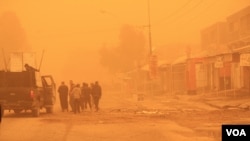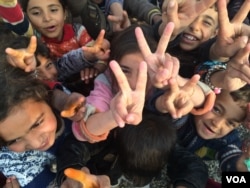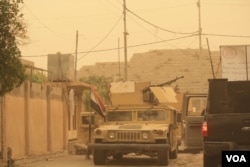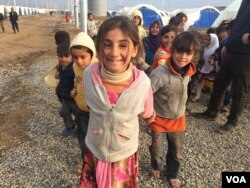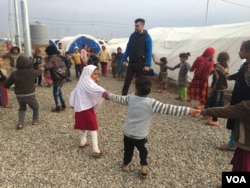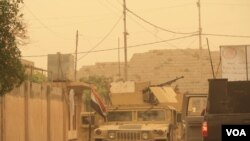“We expected that the children would be afraid,” says Ali, a grandfather who was an herbalist before Islamic State militants took over Mosul. “But they just went on playing while mortars rained down on our neighborhood.”
About four meters away, Iraqi soldiers fire mortars over a brick wall behind which Islamic State militants had retreated a few days ago after a brutal battle. A thick fog engulfs the city and soldiers tell us the weather is an IS tool. In the fog, they say, airplanes can’t see militants so the fighters can move forward unnoticed.
The children in the streets of Mosul seem unaware, racing out of their houses to wave and flash victory signs with their hands at the Iraqi army as it passes by; but, the games they play, says Ali, show just how much two-and-half-years of IS rule changed everything, for everyone.
“My grandchildren line up bullet casings all standing up,” Ali says. “The game is to knock down the whole row by throwing only one bullet casing at the rest.”
Other parents say their children are so consistently re-traumatized, their behavior is unpredictable. “They cry and are afraid all the time,” says Abu Khodaida, the father of 11 in a nearby Mosul neighborhood. “But they play indoors.”
At night, he says, his neighborhood experiences constant mortar fire, and he shows us his bombed out car before we are hurried along by the army as the sky darkens, even though it’s 2 p.m.
Two hours later in Gojali, IS fighters emerge from the fog and shoot a small boy, soldiers tell us. The Iraqi army entered this neighborhood on the outskirts of Mosul more than a month ago, but the weather has made everything different. A few minutes later, gunfire stops and soldiers urge us to drive away, fast.
War games
In the relative safety of the camps about 30 kilometers outside Mosul, other children say they like to play ‘pretend’ like any other youngsters; but, children at the Khazir Camp don’t play ‘cops and robbers.’ They play ‘Islamic State fighting the Iraqi Army.’
“Some of us are Daesh,” says Rafaad, using the pejorative term for IS, while waving an old plastic toy gun. He doesn’t know his age but he looks to be about 10 years old. “And some of us are the Iraqi army.”
“Who wins the battle usually?” my colleague asks the growing group of excited children.
“The Iraqi army!” they shout in unison.
Albeeya, a girl who thinks she is 9 years old but isn’t sure, describes another game she plays with her girlfriends.
“Some of us pretend they work at the camp,” she says, proudly. “And they give some of us papers so we can get things.”
Slips of paper, she explains, are what displaced families bring to aid workers to prove their eligibility for food, fuel, bedding, clothes and anything else they may need to survive. Winter has descended on the camp, and families are increasingly anxious about resources as thousands of people continue to flee Mosul and the surrounding area.
Nearly 80,000 people have already fled in the past two-and-a-half months of conflict. Near where the children play, parents crowd around fenced-in areas where aid workers keep supplies. “I’ve been here since the morning,” one mother said. “The milk is in there, I’m sure of it.”
Another mother passes by, carrying a baby. Another child, a son who looks like he's about 12, carries a sack of rice on his back. “Look, we have to sell our rice to buy milk,” she says as she hustles away.
The group of children continues to describe their games gleefully, with some grabbing hands to demonstrate a singing game.
“If you can get any slips of paper, what would you want to get?” we ask Albeeya.
“Just everything,” she says.
“Everything, like what?” we press.
“Everything,” she repeats, smiling.




